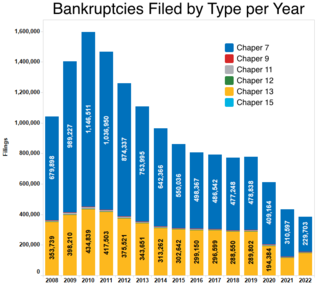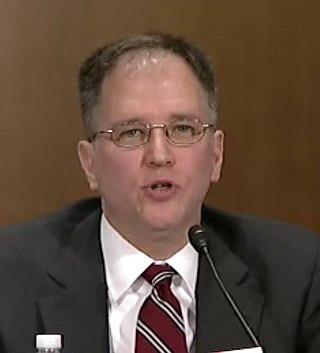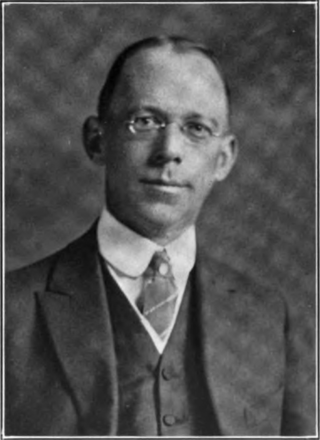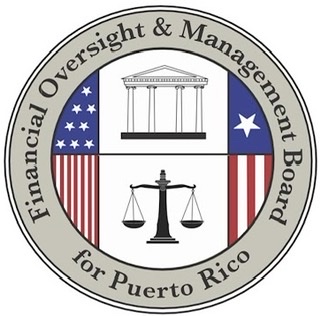Related Research Articles
Debt restructuring is a process that allows a private or public company or a sovereign entity facing cash flow problems and financial distress to reduce and renegotiate its delinquent debts to improve or restore liquidity so that it can continue its operations.
Cravath,Swaine &Moore LLP is an American white-shoe law firm with its headquarters in New York City,and additional offices in London and Washington,D.C.

In the United States,bankruptcy is largely governed by federal law,commonly referred to as the "Bankruptcy Code" ("Code"). The United States Constitution authorizes Congress to enact "uniform Laws on the subject of Bankruptcies throughout the United States". Congress has exercised this authority several times since 1801,including through adoption of the Bankruptcy Reform Act of 1978,as amended,codified in Title 11 of the United States Code and the Bankruptcy Abuse Prevention and Consumer Protection Act of 2005 (BAPCPA).

The Ambac Financial Group,Inc.,generally known as Ambac,is an American holding company. Its subsidiaries provide financial guarantee products such as bond insurance to clients in both the public and private sectors globally. Ambac Assurance is a guarantor of public finance and structured finance obligations. Its common stock and common stock purchase warrants are listed on the NYSE under the symbols AMBC and AMBCW respectively. Ambac is regulated by the insurance commission of Wisconsin. It has its headquarters in Lower Manhattan,New York City.
Arthur J. Gonzalez is a senior fellow at New York University School of Law and member of the PROMESA oversight board in charge of resolving the Puerto Rican government-debt crisis. Before his retirement from the bench,he was chief judge of the United States Bankruptcy Court for the Southern District of New York.

Todd Joseph Zywicki is an American lawyer,legal scholar and educator. He is a George Mason University Foundation Professor of Law at George Mason University School of Law,teaching in the areas of bankruptcy and contracts.

The Bankruptcy Act of 1898 was the first United States Act of Congress involving bankruptcy to give companies an option of being protected from creditors. Previous attempts at federal bankruptcy laws had lasted,at most,a few years.
Lawrence A. Cunningham is a corporate director and advisor,author,professor and lawyer. He is the founder and managing partner of the Quality Shareholders Group and special counsel with an international law firm. Cunningham is best known as an expert on corporate governance. He is also known for his knowledge of the history and corporate culture of Berkshire Hathaway and Warren Buffett. He has served on the board of directors of many companies,including Constellation Software,Kelly Group Partners,and Markel Group.
Widener University Delaware Law School is a private law school in Wilmington,Delaware. It is one of two separate ABA-accredited law schools of Widener University. Widener University Law School was founded in 1971 as the Delaware Law School and became affiliated with Widener in 1975. In 1989,it was known as Widener University School of Law when it was combined with the campus in Harrisburg,Pennsylvania. In 2015,the two campuses separated,with the Harrisburg one renamed to Widener University Commonwealth Law School.
Chapter 9,Title 11,United States Code is a chapter of the United States Bankruptcy Code,available exclusively to municipalities and assisting them in the restructuring of their debt. On July 18,2013,Detroit,Michigan became the largest city in the history of the United States to file for Chapter 9 bankruptcy protection. Jefferson County,Alabama,in 2011,and Orange County,California,in 1994,are also notable examples. The term 'municipality' denotes "a political subdivision or public agency or instrumentality of a State," but does not include a state itself. States are therefore unable to file for bankruptcy even though they have defaulted in their obligations.

Mark J. Roe is the David Berg Professor of Law at Harvard Law School,appointed in 2001.
Frank Partnoy is a Professor of Law at the University of California Berkeley School of Law. He was a George E. Barrett Professor of Law and Finance and the founding director of the Center on Corporate and Securities Law at the University of San Diego,where he taught for 21 years. He is a scholar of the complexities of modern finance and financial market regulation. He worked as a derivatives structurer at Morgan Stanley and CS First Boston during the mid-1990s and wrote F.I.A.S.C.O.:Blood in the Water on Wall Street,a book about his experiences there.
John Anthony Edwards Pottow is the John Philip Dawson Collegiate Professor of Law at the University of Michigan Law School,specializing in international commercial law,bankruptcy and consumer finance. In addition to scholarship,Pottow is known for pro bono work and has argued pro bono cases before the United States Supreme Court and several United States Courts of Appeals,winning an award for pro bono service. His public service in international trade law includes service on the United States Delegation to the United Nations Commission on International Trade Law (UNCITRAL) and the State Department's Advisory Committee on Private International Law.

William Gordon Mathews was a Federal judge and lawyer from Charleston,West Virginia,serving as Referee in Bankruptcy for Kanawha,West Virginia 1898-1908,and Clerk of the Court for Kanawha 1903-1904.
The Puerto Rican government-debt crisis was a financial crisis affecting the government of Puerto Rico. The crisis began in 2014 when three major credit agencies downgraded several bond issues by Puerto Rico to "junk status" after the government was unable to demonstrate that it could pay its debt. The downgrading,in turn,prevented the government from selling more bonds in the open market. Unable to obtain the funding to cover its budget imbalance,the government began using its savings to pay its debt while warning that those savings would eventually be exhausted. To prevent such a scenario,the United States Congress enacted a law known as PROMESA,which appointed an oversight board with ultimate control over the Commonwealth's budget. As the PROMESA board began to exert that control,the Puerto Rican government sought to increase revenues and reduce its expenses by increasing taxes while curtailing public services and reducing government pensions. These measures provoked social distrust and unrest,further compounding the crisis. In August 2018,a debt investigation report of the Financial Oversight and management board for Puerto Rico reported the Commonwealth had $74 billion in bond debt and $49 billion in unfunded pension liabilities as of May 2017. Puerto Rico officially exited bankruptcy on March 15,2022.

Eric LeCompte is an American commentator on politics,finance and religion. He serves on a working group with the UN Conference on Trade and Development. He is the current executive director of Jubilee USA Network. Prior to working with Jubilee USA,he served as the event coordinator at School of the Americas Watch.

The Puerto Rico Oversight,Management,and Economic Stability Act (PROMESA) is a U.S. federal law enacted in 2016 that serves as a custom-made Bankruptcy law for Puerto Rico. It establishes a process for restructuring debt,and expedited procedures for approving critical infrastructure projects in order to combat the Puerto Rican government-debt crisis. Through PROMESA,the US Congress established a Financial Oversight and Management Board,known colloquially in Puerto Rico as "la junta," to oversee the debt restructuring. With this protection the then-governor of Puerto Rico,Alejandro García Padilla,suspended payments due on July 1,2016. The FCB's approved fiscal austerity plan for 2017-2026 cut deeply into Puerto Rico's public service budget,including cuts to health care,pensions,and education,in order to repay creditors. By May 2017,with $123 billion in debt owed by the Puerto Rican government and its corporations,the FCB requested the "immediate" appointment of a federal judge to resolve the "largest bankruptcy case in the history of the American public bond market."
State defaults in the United States are instances of states within the United States defaulting on their debt. The last instance of such a default took place during the Great Depression,in 1933,when the state of Arkansas defaulted on its highway bonds,which had long-lasting consequences for the state. Current U.S. bankruptcy law,an area governed by federal law,does not allow a state to file for bankruptcy under the Bankruptcy Code. Certain politicians and scholars have argued that the law should be amended to allow states to file for bankruptcy.
Financial Oversight and Management Bd. for Puerto Rico v. Aurelius Investment,LLC,590 U.S. ___ (2020),was a United States Supreme Court case in which the Court held that appointments to the Financial Oversight and Management Board for Puerto Rico are not subject to the restrictions in the Appointments Clause of the U.S. Constitution. The Court held that all officers of the United States are subject to the Appointments Clause even if their duties relate to Puerto Rico. However,the power they exercise must be primarily federal in nature for the Clause to apply. If the officer exercises powers primarily of a local nature,even if created by federal law,then the officer is not "of the United States" and is exempt from compliance with the Clause. As members of the Board are primarily concerned with the governance of Puerto Rico,even though their decisions have potentially nationwide consequences,their powers are primarily local in nature and need not be appointed in compliance with the Clause.

Financial Oversight and Management Board for Puerto Rico (FOMBPR),colloquially known as La Junta de Control/Supervisión Fiscal is a government entity whose role to revise and approve the budget and obligations of the government of Puerto Rico was created by federal law PROMESA.
References
- 1 2 "President Obama Announces the Appointment of Seven Individuals to the Financial Oversight and Management Board for Puerto Rico". August 31, 2016.
- ↑ Reviewed at:
• Barton Swaim (2014, Nov. 22) "How Christianity Explains Beauty and Suffering," Wall Street Journal.
• Robert T. Miller (2015, February). "Experience Explained," First Things.
• Todd Zywicki (2015, February 2), "Review of David Skeel, True Paradox: How Christianity Makes Sense of Our Complex World," Washington Post. - ↑ Reviewed at:
• Louis Massard (2012), "A Review of The New Financial Deal by David Skeel", 16 N.C. Banking Inst. 16(1), pp. 435-63. - ↑ Reviewed at:
• Janis Sara (2003), "Book Review: Debt's Dominion: A History of Bankruptcy Law in America, by David A. Skeel Jr," Osgoode Hall Law Journal, 41(4), pp. 734-740.